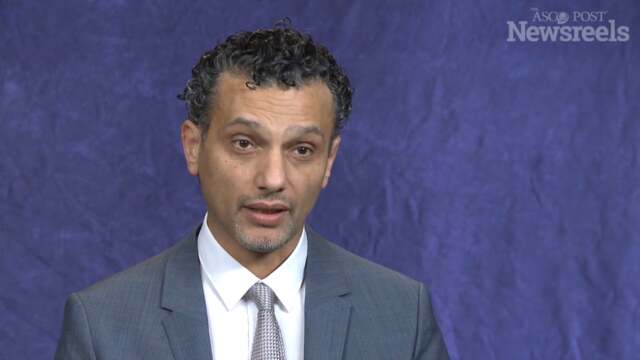Quick Takes on Studies in Noncolorectal Gastrointestinal Cancers
In this roundup, The ASCO Post offers a glance at key findings from studies in noncolorectal gastrointestinal malignancies presented at the European Society for Medical Oncology (ESMO) 2017 Congress from investigators around the world. Docetaxel-Based Triplet in Gastric Cancer The superiority of...
EXPERT POINT OF VIEW: Eric Van Cutsem, MD, PhD
Invited discussant Eric Van Cutsem, MD, PhD, of University Hospitals Leuven, Belgium, commented that both ATTRACTION-02 and KEYNOTE-059 suggest that anti-PD [programmed cell death protein] antibodies have activity in advanced gastric cancer, but their findings differed with regard to the impact of ...
Anti–PD-1 Agents Gaining Momentum in Gastric Cancer
In updates of two important studies in metastatic gastric cancer reported at the European Society for Medical Oncology (ESMO) 2017 Congress, nivolumab -(Opdivo) and pembrolizumab (Keytruda) demonstrated activity—but to varying degrees and with some nuances. “Anti-PD [programmed cell death protein]...
Survival in Patients Treated With Adjuvant Chemoradiotherapy After Resection of Gastric Cancer
In the CALGB 80101/Alliance trial, no difference in overall survival was found for adjuvant chemoradiotherapy with epirubicin, cisplatin, and fluorouracil (ECF) vs fluorouracil and leucovorin (5-FU/LV) after curative resection of gastric cancer. The findings were reported in the Journal of Clinical ...
Immunotherapy for Previously Treated Advanced Gastric Cancer
In an Asian phase III trial (ONO-4538-12, ATTRACTION-2) reported in The Lancet, Kang et al found that nivolumab (Opdivo) produced an improvement in overall survival vs placebo in patients with advanced gastric or gastroesophageal junction cancer who had disease refractory to or who were intolerant...
Nivolumab Approved in Japan for Unresectable Advanced or Recurrent Gastric Cancer That Has Progressed After Chemotherapy
On September 22, Bristol-Myers Squibb Company announced that the Japanese Ministry of Health, Labor and Welfare (MHLW) approved nivolumab (Opdivo) for the treatment of unresectable advanced or recurrent gastric cancer which has progressed after chemotherapy. This approval was based on the phase III ...
Addition of MET Inhibitor to First-Line Chemotherapy in Advanced Gastric Cancer
The phase III RILOMET-1 trial showed no survival benefit of adding the MET inhibitor rilotumumab to first-line epirubicin, cisplatin, and capecitabine in patients with advanced MET-positive gastric or gastroesophageal junction adenocarcinoma. These results were reported in The Lancet Oncology by...
FDA Grants Accelerated Approval to Pembrolizumab for Advanced Gastric Cancer
On September 22, 2017, the U.S. Food and Drug Administration (FDA) granted accelerated approval to pembrolizumab (Keytruda) for patients with recurrent locally advanced or metastatic, gastric or gastroesophageal junction adenocarcinoma whose tumors express programmed cell death ligand 1 (PD-L1) as...
Regorafenib in Hepatocellular Carcinoma Previously Treated With Sorafenib
On April 27, 2017, the indications for regorafenib (Stivarga) were expanded to include treatment of patients with hepatocellular carcinoma who have been previously treated with sorafenib (Nexavar).1,2 Supporting Efficacy Data The new approval was based on the finding of improved overall survival...
ESMO 2017: Pembrolizumab Shows Promising Response Rate in Pretreated Metastatic Gastric Cancer
Pembrolizumab (Keytruda) has shown a promising response rate in patients with pretreated metastatic gastric cancer, according to late-breaking results from the KEYNOTE-059 trial presented at the 2017 European Society for Medical Oncology (ESMO) Congress in Madrid (Abstract LBA28_PR). The expected...
Cytoreductive Surgery With Hyperthermic Intraperitoneal Chemotherapy
In a single-center experience reported in JAMA Surgery, Eng et al found that an increased intraoperative fluid rate was associated with increased perioperative morbidity in patients with peritoneal cancer undergoing cytoreductive surgery with hyperthermic intraperitoneal chemotherapy. Study...
Health-Related Quality of Life With Everolimus vs Placebo in Patients With Neuroendocrine Tumors
As reported in The Lancet Oncology by Pavel et al, no significant difference in deterioration of health-related quality of life was observed with everolimus (Afinitor) vs placebo in the phase III RADIANT-4 trial, which included patients with advanced nonfunctional well-differentiated...
Relationship Between Molecular Subtypes of Gastric Cancer and Prognosis
In 2014, The Cancer Genome Atlas (TCGA) project discovered there are four molecular subtypes of gastric cancer: Epstein-Barr virus (EBV), microsatellite instability, genomically stable, and chromosomal instability. However, their clinical significance is unknown. Now, a study by Bo Hwa Sohn, PhD,...
Positioning Lu-177 Dotatate Therapy and 68-Ga Dotatate Scans in Management of Neuroendocrine Tumors
The results of the phase III NETTER-1 trial, recently published in The New England Journal of Medicine,1 have been met with great interest by clinicians who treat neuroendocrine tumors. In patients with advanced midgut lesions, treatment with the radiopharmaceutical lutetium Lu-177 dotatate...
‘Sidedness’ in Colon Cancer: Using the Data in the Clinic
The evidence from clinical trials has established that “side matters” when it comes to colorectal cancer outcomes. How do clinicians use this information in their practices? Christina Wu, MD, of Emory University, shared her thoughts with attendees at the 2017 Debates and Didactics in Hematology and ...
Adding First-Line Selective Internal Radiotherapy to Chemotherapy in Patients With Liver Metastases From Colorectal Cancer
A meta-analysis of three randomized trials (FOXFIRE, SIRFLOX, and FOXFIRE-Global) indicates no overall survival benefit of adding first-line selective internal radiotherapy to chemotherapy in patients with liver metastases from colorectal cancer. The findings were reported by Wasan et al in The...
FDA Actions Yield Extended Approvals of Novel Agents, Advisory Committee Votes Favorably on Two Biosimilars and Pediatric Indication for CAR T-Cell Therapy
DURING JULY, the U.S. Food and Drug Administration (FDA) and its Oncologic Drugs Advisory Committee (ODAC) made a number of approvals and recommendations on a variety of oncology products. Neratinib ON JULY 1 7, the FDA approved neratinib (Nerlynx) for the extended adjuvant treatment of adult...
Classifying Gastric Cancers by Subtype May Provide Tailored Treatment Options
Gastric cancer is the third leading cause of cancer death in both men and women worldwide. In 2014, The Cancer Genome Atlas (TCGA) project discovered there are four molecular subtypes of gastric cancer: Epstein-Barr virus (EBV), microsatellite instability (MSI), genomically stable (GS), and...
ESMO World GI 2017: Study Explores Association of Mediterranean Diet Components With Advanced Colorectal Polyps
The benefits of a Mediterranean diet are well known when it comes to colorectal protection, but it’s hard to know specifically what elements of the diet are the healthiest. Now a new study, presented by Fliss Isakov et al at the ESMO 19th World Congress on Gastrointestinal Cancer, suggests...
Some Patients With Stage III Low-Risk Colon Cancer May Require Less Oxaliplatin Therapy
Patients with stage III colon cancer considered at low risk for recurrence may be treated effectively—and incur less neurotoxicity—with 3 months of an oxaliplatin-based regimen as compared with the standard 6 months, according to the results of the International Duration Evaluation of Adjuvant...
Expert Point of View: Daniel G. Coit, MD
“While these results are clearly superior to historical controls, the study prompts a number of questions,” session moderator, Daniel G. Coit, MD, a surgical oncologist at Memorial Sloan Kettering Cancer Center in New York, commented in an interview. “Nearly half of the patients received systemic ...
Hyperthermic Intraperitoneal Chemoperfusion May Be Efficacious for Peritoneal Metastases
Hyperthermic intraperitoneal chemoperfusion is efficacious when used as part of multimodality therapy for low-volume peritoneal metastases of gastric cancer, suggests a prospective single-arm phase II trial.1 Among the 19 patients enrolled, all of whom had stage IV disease with either...
10-Year Outcomes With Two Dose Levels of Imatinib in Unresectable or Metastatic GIST
Casali et al have reported 10-year progression-free and overall survival rates among patients with locally advanced unresectable or metastatic gastrointestinal stromal tumors (GISTs) receiving imatinib at 400 or 800 mg/d in the phase III European Organisation for Research and Treatment of Cancer,...
Increased Recognition of Colorectal Cancer in Young Adults, Even Those Aged 20 to 29, as Evidence Continues to Accumulate
The incidence of colorectal cancer continues to increase among young adults, with the sharpest increase among those aged 20 to 29, according to a recent article in the Journal of the National Cancer Institute.1 This trend has been called disturbing and ominous, but the widely reported results of...
Protein Component of the Epstein-Barr Virus May Promote the Development of Cancer
After an infection with the Epstein-Barr virus (EBV), the virus persists in the body throughout a person's lifetime, usually without causing any symptoms. About one-third of infected teenagers and young adults nevertheless develop infectious mononucleosis, which usually wears off after a few weeks. ...
‘Collateral Lethality’ May Offer New Therapeutic Approach to Cancers of the Pancreas, Stomach, and Colon
Cancer cells often delete genes that normally suppress tumor formation. These deletions also may extend to neighboring genes, an event known as “collateral lethality,” which may create new options for the development of therapies for several cancers. Scientists at The University of Texas MD...
Expert Point of View: Heinz-Josef Lenz, MD
Heinz-Josef Lenz, MD, of the University of Southern California in Los Angeles, said the results of the ONO-4538 trial were impressive in light of this challenging patient population. “You see a significant benefit in a highly refractory gastric cancer population,” he said. Dr. Lenz cautioned:...
Nivolumab, as Salvage, Improves Overall Survival in Gastric Cancer
Gastric cancer can apparently be added to the growing list of malignancies for which drugs targeting the programmed cell death protein 1 (PD‑1) receptor are effective, according to the results of the phase III ONO-4538 investigation conducted in Asia and presented at the 2017 Gastrointestinal...
Small-Intestine GIST Treated Surgically Associated With Better Prognosis in Younger Patients
Gastrointestinal stromal tumors (GIST) arise is the wall of the digestive tract and most often occur in the stomach or small intestine. Though more common in later in life, GISTs can occur in adolescents and young adults (AYA) under 40 years old as well. In an article published by Fero et al in...
Masanori Terashima, MD, PhD, on Gastric Cancer: Results of the JCOG1001 Trial
Masanori Terashima, MD, PhD, of Shizuoka Cancer Center, discusses phase III study findings evaluating bursectomy for patients with subserosal/serosal gastric cancer (Abstract 5).
Salah-Eddin Al-Batran, MD, on Gastric Cancer: RADPAC Trial Results
Salah-Eddin Al-Batran, MD, of the Institute of Clinical Cancer Research and Nordwest Hospital, discusses study findings on paclitaxel with and without RAD001 in patients with gastric cancer whose disease has progressed after therapy with a fluoropyrimidine/platinum-containing regimen (Abstract 4).
2017 GI Cancers Symposium: Nivolumab Demonstrated Efficacy and Improved Survival in Patients With Previously Treated Advanced Gastric Cancer
Results of the ONO-4538-12 trial demonstrated that nivolumab (Opdivo) significantly reduced the risk of death by 37% (hazard ratio [HR] = 0.63; P < .0001) in patients with previously treated advanced gastric cancer refractory to or intolerant of standard therapy, a condition without current ...
No Improvement in Event-Free Survival Reported With More Extensive or Serial Resections in Wild-Type GIST
Findings from the National Institutes of Health Pediatric and Wildtype Gastrointestinal Stromal Tumors (GISTs) Clinic, reported in the Journal of Clinical Oncology by Weldon et al, indicate that more extensive or serial resections are not associated with improvement in event-free survival in...
Liquid Biopsies Identify Molecular Alterations Driving Drug Resistance in Nearly 80% of Patients With Gastrointestinal Cancers
Liquid biopsy technologies are increasingly being used to detect genetic mutations in tumors, giving clinicians the opportunity to see in real time how a patient’s cancer may or may not be responding to treatment. In a study presented recently at the 28th EORTC-NCI-AACR Symposium on Molecular...
EORTC-NCI-AACR 2016: Liquid Biopsies Identify Molecular Alterations Driving GI Cancer Drug Resistance in Nearly 80% of Patients
Ryan Corcoran, MD, PhD, Translational Research Director of the Center for Gastrointestinal Cancers at Massachusetts General Hospital (MGH) Cancer Center, described to attendees of the 2016 EORTC-NCI-AACR Symposium on Molecular Targets and Cancer Therapeutics the results of a program at MGH focused...
EORTC-NCI-AACR 2016: ‘Remarkable Antitumor Activity’ in Phase I Studies of PDGFRα and KIT Mutation Inhibitors
Two studies at the 28th EORTC-NCI-AACR Symposium on Molecular Targets and Cancer Therapeutics in Munich, Germany focused on the inhibition of mutations in the KIT and PDGFRα oncogenes. These genes provide instructions for making proteins that are part of a family of proteins called receptor...
At ESMO 2016, Many Phase III Trials Fail to Meet Primary Endpoints
The 2016 European Society for Medical Oncology (ESMO) Congress revealed many important positive findings from key trials in a number of tumor types, but many highly anticipated phase III trials in advanced disease failed to meet their primary endpoints. The ASCO Post has summarized several of these ...
New NCCN Patient Resources Assist Decision-Making for Patients With Stomach Cancer
According to the American Cancer Society, it is estimated that more than 26,000 people will be diagnosed with stomach cancer in the United States this year, with nearly 1 million new cases diagnosed worldwide each year, according to the World Health Organization. Because there are no early symptoms ...
Martin H. Schuler, MD, on Gastric and GEJ Adenocarcinoma: Results of the FAST Study (German Language Version)
Martin H. Schuler, MD, of the University Hospital Essen, discusses in German findings from this phase II trial of epirubicin, oxaliplatin, and capecitabine with or without the antibody IMAB362 as first-line therapy in patients with advanced CLDN18.2+ disease. (Abstract 614O)
Yung-Jue Bang, MD, PhD, on Gastric Cancer: Results From the GOLD Trial
Yung-Jue Bang, MD, PhD, of Seoul National University Hospital, discusses phase III study findings on olaparib and paclitaxel in patients with advanced gastric cancer who have progressed following first-line therapy. (Abstract LBA25)
Martin H. Schuler, MD, on Gastric and Gastroesophageal Junction Adenocarcinoma: Results of the FAST Study
Martin H. Schuler, MD, of the University Hospital Essen, discusses findings from this phase II trial of epirubicin, oxaliplatin, and capecitabine with or without the antibody IMAB362 as first-line therapy in patients with advanced CLDN18.2+ disease. (Abstract 614O)
Regorafenib Increases Progression-Free Survival in Advanced Gastric Cancer
The multikinase inhibitor regorafenib (Stivarga) prolonged progression-free survival vs placebo in patients with previously treated advanced gastric carcinoma, in a phase II trial reported in the Journal of Clinical Oncology by Nick Pavlakis, MBBS, PhD, of the University of Sydney, Australia, and...
Chemoradiotherapy After Surgery for Gastric Cancer Shows Similar Outcomes to Postoperative Chemotherapy
Postoperative treatment intensification with chemoradiotherapy does not achieve better outcomes when compared with postoperative chemotherapy in patients with gastric cancer who have already undergone preoperative chemotherapy, according to phase III data presented by Marcel Verheij, MD, PhD, et...
World GI 2016: Chemoradiotherapy After Surgery for Gastric Cancer Shows Similar Outcomes to Postoperative Chemotherapy
Postoperative treatment intensification with chemoradiotherapy does not achieve better outcomes compared to postoperative chemotherapy in patients with gastric cancer who have already undergone preoperative chemotherapy, according to phase III data presented by Verheij et al at the ESMO 18th World...
Higher Prediagnostic Plasma Vitamin D Levels May Be Associated With Prolonged Survival in Pancreatic Cancer
In a study reported by Yuan et al in the Journal of Clinical Oncology, higher prediagnostic plasma 25-hydroxyvitamin D [25(OH)D] levels were found to be associated with prolonged overall survival in patients with pancreatic cancer. Study Details The study involved data from 493 patients from 5...
Study Finds Regorafenib Increases Progression-Free Survival in Advanced Gastric Cancer
The multikinase inhibitor regorafenib (Stivarga) prolonged progression-free survival vs placebo in patients with previously treated advanced gastric carcinoma, in a phase II trial reported in the Journal of Clinical Oncology by Pavlakis et al. A regional difference in treatment effect was observed. ...
Increased Risk of Gallbladder Cancer May Be Associated With Consuming Large Amounts of Sweetened Beverages
A large prospective Swedish study reported by Susanna C. Larsson, PhD, of the Unit of Nutritional Epidemiology at the Institute of Environmental Medicine at Karolinska Institutet in Stockholm, Sweden, and colleagues found a 2.2-fold increased risk of gallbladder cancer in people who consumed two or ...
Anti–PD-1 Treatment With Pembrolizumab in Gastric/Gastroesophageal Junction Cancers: Who Is Likely to Respond?
Immune checkpoint inhibitors have emerged as one of the most promising new areas of drug development in oncology. Broad activity has been observed for these agents across a spectrum of hematologic malignancies and solid tumors. As reviewed in this issue of The ASCO Post, Muro and colleagues now...
Pembrolizumab Active in PD-L1–Positive Advanced Gastric Cancer and Triple-Negative Breast Cancer
The KEYNOTE-012 phase Ib trial assessed single-agent pembrolizumab (Keytruda) in patients with advanced programmed cell death ligand 1 (PD-L1)–positive gastric cancer, triple-negative breast cancer, urothelial cancer, and head and neck cancer. The activity of pembrolizumab in study patients with...
Treatment Update in Gastric, Pancreatic, and Colorectal Cancers
Although new gastrointestinal cancers are on the rise, advancements in their treatment, as well as the upcoming results of perioperative trials, could prove to be “clinical practice game-changers,” declared Thomas J. George, Jr, MD, FACP, at the 2016 Community Oncology Conference in Orlando,...





